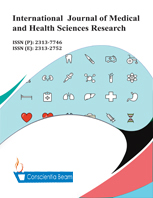Exploring Social Opportunities for and Constraints to Primary Healthcare Seeking behavior in Urban Bangladesh: A Study on Rajshahi City
DOI:
https://doi.org/10.18488/journal.9/2017.4.2/9.2.15.27Abstract
Most of the slum dwellers in Rajshahi city, Bangladesh, come here from rural areas either forcefully or willingly for various purposes. They naturally lead a miserable life here which causes various health problems. Different organizations therefore come forward to the establishment of primary healthcare centers for meeting their growing demands for healthcare services. The main objective of this paper was thus to explore how social issues created opportunities for and barriers to healthcare seeking behavior among the urban poor women. This study is of importance that findings of the study will help achieve the 3rd Sustainable Development Goal (SDG)—ensuring healthy lives and promoting well-being for all at all ages—at the right time (2030). Two hundred females in Rajshahi city were interviewed by using a semi-structured questionnaire interview method. Levels of monthly household income and of education are used as proxy determinants of class. There has been an increase in the availability of and accessibility to primary healthcare services for the poor urban women due to making healthcare services available at people doorsteps and developing awareness though some social issues like the lack of knowledge about the nearest centers, their beliefs in and perception of illness and treatment, inappropriate time set-up and high costs associated with treatment and medicine sometimes dissuade them from availing the reachable healthcare services. More hygienic behavior among them found albeit they have few sanitary latrines which push their lives at greater risks. As suggested, if all these social issues are seriously taken into consideration in the formation and adaptation of the future policy, the Bangladesh Government can easily meet the 3rd SDG.

